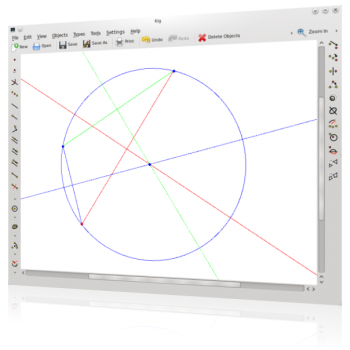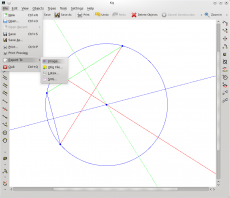Kig: Difference between revisions
Appearance
Pipesmoker (talk | contribs) m Added breadcrumbs & formatting strings a bit |
Pipesmoker (talk | contribs) |
||
| Line 36: | Line 36: | ||
Since '''Kig''' can import and use third-part macros as built-in objects, it can have new objects, being more and more powerful. | Since '''Kig''' can import and use third-part macros as built-in objects, it can have new objects, being more and more powerful. | ||
If you don't know how to import a macro, please read the FAQ. | If you don't know how to import a macro, please read the [[Kig/FAQ|FAQ]]. | ||
* [[Kig/Macros | Browse existing macros...]] | * [[Kig/Macros | Browse existing macros...]] | ||
[[Category:Education]] | [[Category:Education]] | ||
Revision as of 09:07, 24 June 2010
Home >> Applications >> Education >> Kig
| Kig is a program for exploring geometric constructions. |
Kig is part of the KDE Education Project.
 |
All three segment axes of a triangle intersect in one point which is the center of the circumscribed circle. |
Kig is meant as a better replacement for such free programs as KGeo, KSeg and Dr. Geo and commercial programs like Cabri.
Kig is a useful and powerful utility for high school students and teachers, and as a fun project for me and others. I have learned a lot by working on it, and it's fun to work together with other people on it. I've written much of the Kig code myself, but I've also had a lot of help from other people.
Features
Screenshots
 |
Kig exports to several formats: bitmap images, XFig and SVG vector format, LaTeX) |
Documentation
Kig Macros
Since Kig can import and use third-part macros as built-in objects, it can have new objects, being more and more powerful.
If you don't know how to import a macro, please read the FAQ.

